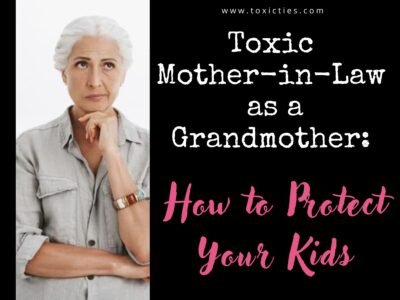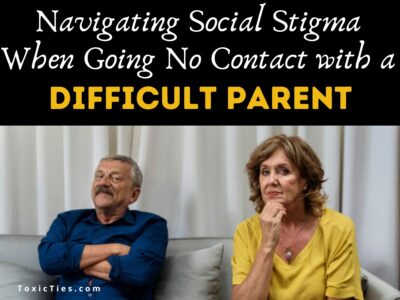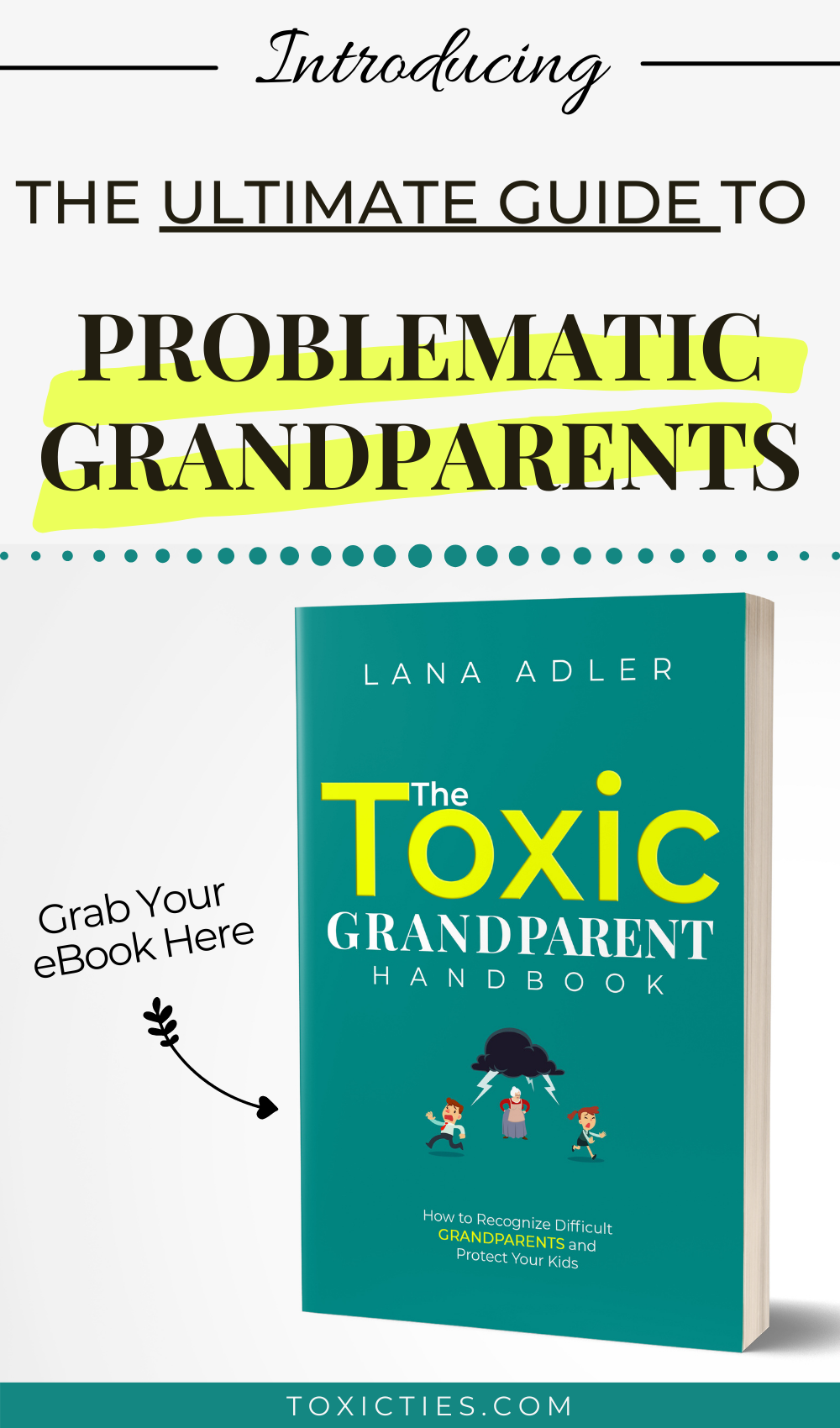Family estrangement is shameful.
You have to stick with your family no matter what.
Blood is thicker than water.
Those are the typical things people say (or think) when they hear about cutting ties with a close relative.
But estrangement from a family member is surprisingly common, and it’s becoming less of a taboo discussion subject.
Nowadays there is a growing understanding that abuse is not OK and that when a relationship becomes toxic, it’s better to end it.
In this post we will delve deeper into the causes of family estrangement, and why (in certain circumstances) it’s OK to cut ties with family.
Let’s start with the definition.
What is Family Estrangement?
Family estrangement is the cessation of all contact with a family member due to irreconcilable differences and disagreements.
Typically, it implies estrangement from a close family member, such as a parent, a sibling, or a child.
When adult children initiate estrangement from one or both parents, it’s called parental estrangement.
When parents initiate estrangement from their child, it’s called disownment.
What Causes Family Estrangement?
According to a recent study, the most common reason for adult children to become estranged from their parents is emotional abuse (a pattern of control through criticism, guilt, humiliation, etc).
For parents estranged from their children, the number one reason is different values and belief systems. For example, a religious father might distance himself from his daughter if she abandons religious practices, behaves in a way that’s inconsistent with his beliefs, and/or marries a person of a different faith.
Divorce is another contributing factor. When parents separate on bad terms, the children often become estranged from one of the parents.
Whatever the specific reasons behind family estrangement, it’s typically a gradual process rather than a sudden disconnect. Years of conflict and tension precede the eventual estrangement.
When Your Family Environment is Toxic
Isn’t it interesting how every family seems to have that one person who causes conflicts and has no boundaries?
Having a toxic family member isn’t all that rare. It could be an obnoxious uncle, a manipulative mother, an annoying cousin, or maybe a toxic mother-in-law.
What’s rare is when a whole family recognizes the “troublemaker” and stands up to them.
Typically, it’s the opposite. A toxic family member will skillfully manipulate everyone by playing the victim, bullying, controlling, gaslighting, etc.
So the victims are left to fend for themselves. They have a choice: they can either tolerate the abuser or cut ties and risk being ostracized by the entire family.
This choice can be difficult and even agonizing, especially when the toxic relative you’re dealing with is your parent.

Estrangement From Parents
Regardless of the circumstances, there’s nothing more painful than to find yourself in a position where the relationship with your parent(s) is impossible.
Children are attached to their caregivers — even when the parents fail to love and care for them the way any good parent should. So if a child grows up and chooses to sever ties with mom or dad, it’s usually because they’ve reached their pain limit.
There’s only so much you can take from someone before you say: No more!
As previously mentioned, continued emotional abuse is the most common reason for parental estrangement.
Another one is difficult childhood histories. All parents make mistakes. But toxic parenting leaves deep emotional wounds most people struggle with their whole lives.
It’s not easy to forgive your parents for the abuse and move on as if nothing happened. But that’s exactly what they expect you to do! They act as if they’ve done nothing wrong and you’re crazy for suggesting otherwise.
When a parent refuses to take responsibility for the pain they’ve caused, it has a devastating effect on the adult child. It’s like experiencing that childhood trauma all over again.
This failure to acknowledge and apologize is the reason why most adult children of toxic parents are unable to process the pain and move on.
What’s worse is when the abuse is ongoing and you don’t feel safe around your parent.
If that’s the case, discontinuing a relationship with them is not only an option, it’s a matter of self-preservation.

Estrangement From Siblings
Estrangement from a sibling (or siblings) is typically a result of
- a painful divorce where children are separated
- irreconcilable disagreements
- resentment over unequal responsibilities
- or a toxic family environment
For example, parental favoritism often pits the siblings against one another, initiating a bitter childhood rivalry that lasts well into adulthood.
This is a well-known dynamic in families where one or both parents have narcissistic features.
A narcissistic parent will choose one child as the perfect reflection of themselves (“golden child“), while the other one will be forced into a role of a “scapegoat” who embodies all the negative, undesired parts of the narcissist.
Another reason for sibling estrangement is money. If a parent left unequal inheritances to their children, it will surely cause resentment and, possibly, estrangement.
Then there are caregiving responsibilities. If one sibling “abandons” the family to pursue their dreams while the other one stays behind and takes care of the aging parent(s), it can cause an estrangement between the siblings.

How Do You Fix Family Estrangement?
Estrangement doesn’t happen overnight. It’s a long and torturous path paved with tears, doubt, and agony.
For that reason, there’s no easy and quick fix for family estrangement. if it took a long time to get there, it’s going to take a long time to come back.
Besides, oftentimes people can’t even agree on what happened. Disputes about who said what and who should apologize to whom can go on for years.
So there’s no one version of the events everyone agrees on, exacerbated by other family members chiming in with their opinions and further mudding the water.
However, fixing family estrangement is possible if both sides are open to reconciliation and willing to confront the deeper reasons behind the alienation.
Whether you’re estranged from your parent, child, or sibling, consulting a mental health professional can help.
Try to find a psychologist or an MFT (marriage and family therapist) who specializes in difficult family mediation. Then see if your estranged family member will be willing to sit down with you and the therapist to try to mend the relationship.
Moving on From Family Estrangement
Family estrangement can cause extreme stress. You’ve experienced a loss similar to death. And even if the relationship was painful and exhausting, expect that you will go through a period of grieving.
So it’s important to practice patience, self-compassion, and self-care.
Good self-care includes healthy eating habits, exercising, getting enough sleep, and engaging in activities that you enjoy.
Self-compassion, on the other hand, is making sure that you don’t bury yourself under a ton of guilt, blame, resentment, or anger.
Remember: you are not a bad person for choosing estrangement. It doesn’t mean that there’s something wrong with you or that you failed.
In fact, estrangement can be an act of courage, empowerment, and liberation.
However, the absence of that person will hurt, and some days will be worse than others. You will miss your family member, especially when something good happens to you — like getting married or getting a promotion at work. You’ll wish you could share it with them.
It’s natural. We’re wired to be connected to our family, and we crave praise and unconditional acceptance from them. But when a loving, supportive relationship with a family member is impossible, it may be time to move on.
If you do decide to cut ties with someone close to you, try not to ruminate about the past or wonder about the future. Let go of anger or guilt. Instead, redirect that energy into creating the best life for yourself and your family.
Getting away from an abusive relative takes a lot of strength, so you should be very proud of yourself!
Reconciliation may or may not happen in the future. But right now, the best thing you can do is accept the situation and move on.
Because when you close the door to people who can’t be loving and kind to you, you open the door to those who can.
References
Conti, R.P. (2015). Family Estrangement: Establishing a Prevalence Rate. Journal of Psychology and Behavioral Science. December 2015, Vol. 3, No. 2, pp. 28-35.
Jack, C. (2020). The Shame and Guilt of Family Estrangement. Retrieved from Psychology Today.
Family Estrangement: Advice and Information for Adult Children. Retrieved from Stand Alone.
How Do You Handle Being Estranged from Family? Retrieved from Goop.









This article hits home. My parents told me not to contact again after I highlighted the way they treated my wife both before our son was born, and after the difficult time of a difficult pregnancy. My wife suffers from a condition where she will rapidly lose energy, and she went to bed early when they were visiting. I was told “She should’ve stayed up to entertain us”. That’s just one of many things they’ve commented on. Others are our parenting style, moving away for new jobs, and outright denial of the situation. It nearly cost our marriage. It has been 8 months since we’ve spoke, and I’m less interested than ever in reconciliation. I’ve spoken with therapists, we’ve gone to counseling as a couple, and I recognized ways to improve my behavior.
On the flip side though, I feel guilt, shame, but most of all I feel a growing anger toward my parents. It never subsides, it only grows. I bury it and try to get on with life, but at least once a day, it rises. Nobody in the family will call them out, so I’m angry with them. I feel isolated with no way out. It’s a horrible place but I’m not going to wish it was how it was before. I chose to marry my wife. I didn’t choose them.
People who have never dealt with a Narcissist have no idea what they are saying when they tell you “You have to stick with family no matter what.” This is why Narcissists target close family members. They are nice to everyone else, and nice to you in front of everyone else, which is why no one believes you if you try to explain things to them. You just don’t know how devious the human mind can be unless you have been in the cross hairs of a Narcissist!
My review of this article, is very open. I can relate to it all! So, find it helpful. I have been gradually for 7+ years going thru estrangement of children, family and friends. I have 2 wonderful parents so they are not included in this commentary. As I am dealing with the estrangement it is always there in thoughts. I find it to be generational somehow, each generation has actually become a group, like the groupie comment. The generation coming my children, nieces and nephews, the one I am in 55 and up and the one ahead my older siblings and cousins. I would have to say it I almost they should all be brain washed and placed in a neighborhood and just move on! Like we never knew each other, wait maybe that I what I want! However, I deal with it and have been incognito for 2 years, change my cell move and no one has my address and hopefully with cut all feelings and mental ties with them. I met someone @ 19 before my 1st child was born that said to me, prepare for a roller coaster ride (he said it more descriptive if you know what I mean) while I do have 1 younger child now and do not compare the past with the future. I do not live in the past and look forward to my relationships in the future. But I can go on and on….Anyway, I am no spring chicken and look in the mirror as well. I wanted to find a place to say something no one will ever read or ask about it. I know deeply how these relationships can be in your thoughts daily, think positively, positive routine don’t break it, set up your coffee machine daily, career\work, pay bills on time, eat on time, and if you have a lover like I do, treat him or her special be loving and enjoyable, be different than your past or estrangements, reset yourself everyday to see a new you! 1 last thing find good people to conversate with, strangers are always the best to chat with. Be Safe All:
Hi Harry,
that’s a beautiful message. Thank you for sharing!
Lana
for me it’s my cousins he’s been told lies about my family and I by his grandparents
What do you do when your daughter in-law is abusive towards the grandparents and holds the grandchild hostage to get what she wants? Including money and unreasonable favors? I have never in my life experienced a person like this. I have done everything imaginable to help but the demands she puts on my husband and myself are unbelievable.
Hi, Louise. If I where you. I would take my husband and go on a vacation and live the rest of my life loving him and each other, because the grandchildren are young and will make up their own minds when they are adults, if they want to know G-Pa and G-Ma they will come to you both, in the mean time stay healthy and go enjoy your lives till they can fend for themselves, holding grandparents hostages is brutal but not a crime. I have friend that his daughter cut him off he took her to court and loss…..
Thank you so much for writing this article. I’ve been trying to move on from toxic parents for almost 13 years. After many years of explaining my feelings extensively and encouraging them to even just acknowledge that it happened the way that it actually did, they just will not accept that their behavior is what caused our estrangement. It has been an excruciatingly painful journey. Your words were very helpful to me, so I just want to let you know that I appreciate you!
I find it odd and very telling the writer of these books has nothing aa far as my bv research goes about ADULT CHILDREN who make up lies for attention. Making their parents look like monsters . The child that carries on these lies for decades . Even dragging future grandchildren into their drama What do you do about them? Sure you cut Tues but then come grandchildren.
.
Cheyenne,
I represent a specific segment of the population: adult children who went through abusive or traumatic experiences with their parents or other caregivers. My goal is to provide education and tools to those who’ve experienced abuse but can’t even name what they went through or going through. I don’t write about every topic out there — only what I experienced and researched extensively over the last 10 years. I assure you, most adult children do not make up lies about their parents for attention. Perhaps, if the parents listened more or admitted making some mistakes in the past, family estrangement wouldn’t be such a common issue.
Lana, approximately 67 million in the U.S., and 5 million estranged adult children in the U.K., not to mention Australia, South Africa and other countries that have an epidemic of adult child estrangement. The numbers defy the idea that estranged parents are abusive. It is the younger generation who invented and promulgated the idea of “safe spaces”, and a whole cancel culture. The word, “toxic” is never really defined and seems to be a catch-all for anyone who disagrees with another person. And as far as parents “listening more,” these are supposed to be adult children who are free to run their own lives and have their own opinions just like their parents. And why do they need emotional support from a parent at their age? My gosh, are we to parent these kids all their lives? If an adult child wants to shun his parents, that’s up to them but they don’t need to lie about their parents to justify it. And don’t come back later and ask for money or to bail them out of their trouble. If they don’t like a parent’s divorce, they have a life of their own to worry about. I have no room for a perpetual adolescent who at 37 is still crying about how their parent didn’t do this or that for them. Honestly, they should be embarrassed.
These little ( non traditional advisory groups) are really boring.
These are such fictitious little groupies.